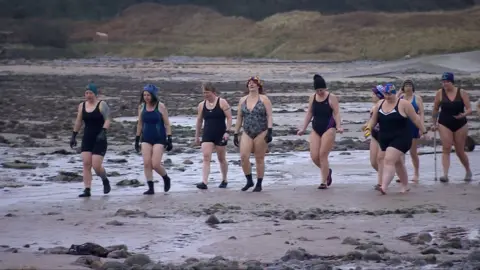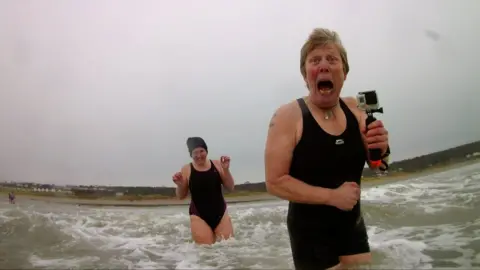Women cold water swimming in Gower to help menopause
A group of cold water swimmers have said that plunging into sea temperatures as cold as 6C is helping with the effects of the menopause.
Some also reported improvements in their mental health.
"I didn't realise I was starting to go through the menopause when it happened a few years ago," said Alison Owen, 49.
"I'd read several stories about women who were hitting the menopause and had become anxious or were diagnosed with depression.
"I didn't want anything like that, and I thought I've got to do something to keep myself active and get out there."
Alison left her teaching job last summer to care full time for her daughter who has cerebral palsy, but says that soon afterwards she started to get involved in cold water swimming.
After initially trying sea swimming out for herself around the Gower Peninsula in Swansea, Alison was contacted by other women who were also keen to join in.
"The start of it is just a thrill and excitement. It releases an inner child I suppose, it reminds you what you used to be like before you had kids, before you had a job, before you had a mortgage," she said.

She added that it takes "around 91 seconds of absolute grit" to stay in the water, before the body begins to adjust.
Alison said that the response from women taking part in the swims has been so positive that they formed an impromptu group, The Gower Bluetits, an offshoot of a similar swimming club in Pembrokeshire.
The result is that up to 20 women can be seen charging down the beach screaming before crashing into the sea.

What is the menopause?
The menopause happens when a woman's period stops, and she becomes unable to conceive a child naturally, according to the NHS.
Symptoms can include night sweats, hot flushes, low mood or anxiety and memory problems.
A woman's sex life may also be affected, with decreased sex drive, vaginal dryness and discomfort during sex.
Menopause usually occurs between 45 and 55 years of age, when a woman's oestrogen levels lower.

"I'm going through the menopause," said swimmer Patricia Woodhouse, 53.
"I feel that it's been easier since starting this. The sweats and the night sweats haven't been so bad. I also suffer with anxiety and I've found my anxiety levels don't feel as bad either.
"I still get anxious but it's nothing like it was before."
Patricia puts some of the positive effects she feels down to the triggering of the body's fight or flight mechanism.
"I think it just allows you to let go for 10 minutes, to think about nothing else," she said.
Why does the cold water seem to help?
According to Prof Mike Tipton, an expert in cold water swimming at the University of Portsmouth, the effects the group are reporting are not unusual in the cold water swimming community.
"There is a significant amount of anecdotal evidence that suggests that it works for some things, but we don't know how," he said.
"There are plenty of theories surrounding the effects of cold water swimming but no definitive studies.

"One of the main issues is that it can be very difficult to isolate the different factors involved. Most cold water swimming involves exercise and socialising - two things we know can have a positive impact on mental health."
Because of that, Prof Tipton said it can be extremely difficult to analyse what role, if any, the water's temperature can have.
"Everybody knows that when you go into a cold shower you get a gasping 'cold shock' response," he added.
"This releases the body's stress hormones, the fight or flight response - as a result people talk about feeling euphoric or high.
"But people need to remember they are engaging in a potentially dangerous activity, that same response can stop you being able to hold your breath in water."
Some members said part of the healing effects they feel are down to their voluntary vulnerability.
"It is a freedom," said Patricia.
"It's the same freedom that children have, they've got no inhibitions, nobody cares what they look like when they're that young, they just get in there.
"That's what we do too, we don't care what we look like, there's no competition, it's just about having fun."
